For the past twelve years, the New York based organization Queers for Economic Justice (QEJ) has built a platform for voices of poor and homeless queer people, whose experiences have been ignored by the mainstream movements organizing around LGBT and class issues. But now, facing new financial challenges, largely as a result of their unapologetic and uncompromising analysis of poverty and capitalism, QEJ has announced it is closing its doors.
“What we have always had was a loyal and committed group of donors who believe in what QEJ does, and who gave—not huge sums—but all they could. Yet that wasn’t enough to keep us afloat. We needed to find another way to stay alive and, though we had a strategy, we did not have the time to implement it. Realizing this, we looked at each other and said what we had never said before: We have to close.
This has broken our hearts.”
QEJ carved a space for and by poor and homeless queers that aren’t represented in the mainstream fight for gay rights. They’ve created contingents in corporate-sponsored pride parades for low-income queers and queer people in labor unions. They’ve created space for discussion in homeless shelters for queer and trans* people. They maintained HIV and AIDS as a relevant queer issue. And they made sure that there was a place in their movement for every kind of queer family — especially those that build themselves through the struggle for queer liberation.
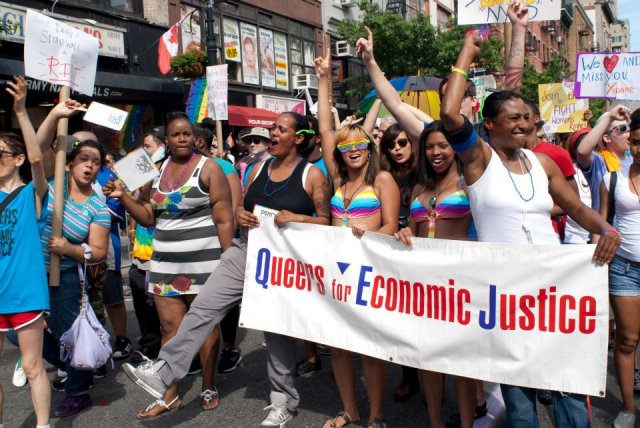
“You would never know that poverty or class is a queer issue,” said Amber Hollibaugh, QEJ Executive Director and founding member. She continued:
“Founding QEJ was, for many of us that were part of it, a statement of …wanting to try to build something that assumed a different set of priorities [than the mainstream gay equality movement]: that talked about homelessness, that talked about poverty, that talked about race and sexuality and didn’t divide those things as if they were separate identities. And most of us that were founding members couldn’t find that anywhere else.”
QEJ’s Mission
Since 2002, QEJ had been one of the guidepost organizations for anti-capitalist organizing that was “committed to promoting justice in a context of sexual and gender liberation.” At the heart of their organizing was a critique of capitalism that centered the experience of poor queers, whose experiences have largely been erased and ignored by the mainstream gay rights and economic justice movements. QEJ was a place where people wouldn’t be given up on. Carlos Blanco a former QEJ organizer and board member started working as an intern for QEJ when he was a student at Columbia University, feeling isolated by Ivy League culture and mainstream organizing tactics.
“When I started I was kind of a naive 20-year-old and I had no idea what was going on in the world, and I was so pro-gay-marriage… and QEJ taught me to take a seat and really think about what it means to be a poor person of color and what it means to be really struggling… I feel like I’d really grown up at QEJ.”
QEJ fought to expand queer liberation from the discussion about marriage, creating Beyond Same-Sex Marriage: A New Strategic Vision For All Our Families and Relationships, which declares,
“The current debate over marriage, same-sex and otherwise, ignores the needs and desires of so many in a nation where household diversity is the demographic norm. We seek to reframe this debate. … We seek to build on these historic accomplishments by continuing to diversify and democratize partnership and household recognition. We advocate the expansion of existing legal statuses, social services and benefits to support the needs of all our households.”
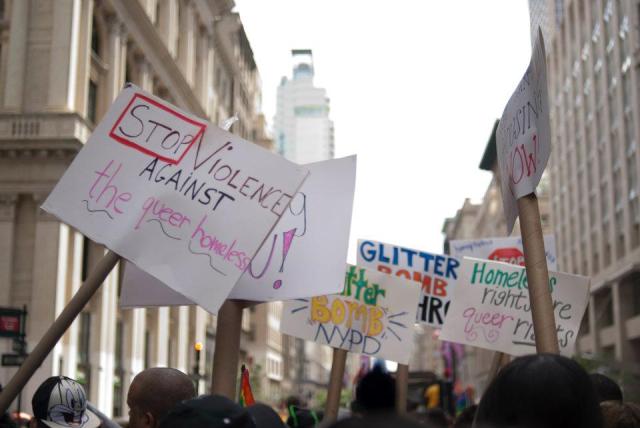
Over their twelve years of operation, QEJ created projects that have radically challenged mainstream approaches to poverty, the shelter system, HIV/AIDS, and families.
“We were going to provide tools to live in a very capitalist and racist world.”
QEJ founding member Jay Toole, got involved when she was living in a shelter after seeking help for crack addiction, and attended an event being held by QEJ’s precursor, the Queer Economic Justice Network, which sparked from the welfare reforms from the Clinton administration. “It was like, oh my God – they’re talking about me!” Toole joined the team and started their shelter program. “They put me to work and you know, it wasn’t just bullshit.” Through the shelter project, QEJ achieved historic strides for queer residents of the New York City shelter system. They helped implement policies that allow people to choose whether to reside in men’s or women’s shelters, and that grant same-sex partners the right to be placed in shelters together. They also ran queer discussion groups in shelters around the City, starting at the New Providence Women’s Shelter in Manhattan, and expanding to over 35 shelters around the city, where queer shelter residents could come together and talk about being queer – no set curriculum or discussion topic necessary. “We never wanted to make it seem like we could solve anyone’s problems,” Blanco said, “We were going to provide tools to live in a very capitalist and racist world.”
The distinctive focus of QEJ on queer and trans* adult homelessness and poverty points to a glaring hole in the mainstream queer movement, and illustrates lack of attention paid to the intersections of queer justice and economic justice. Both Blanco and Hollibaugh pointed out to me that while queer youth homelessness gets a ton of airtime, the minute that queer person turns eighteen, the movement turns its back, suddenly interrogating, “What did you do to be homeless? Why can’t you find work?”
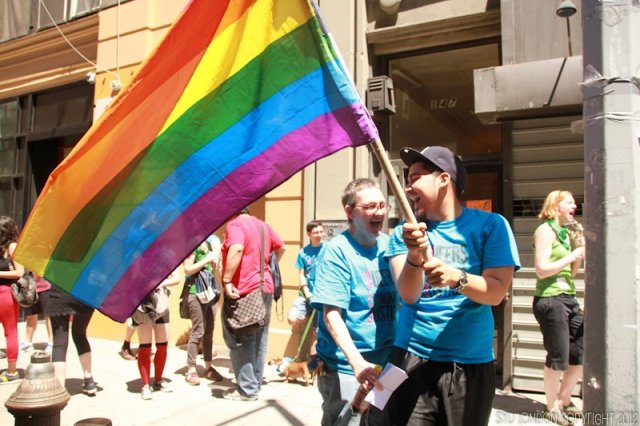
QEJ pushed back and said, we know why so many queer people are homeless, and we know why so many queers can’t find work – the system is stacked against us. The LGBT MAP has shown that queer people, and queer people of color in particular, face barriers to employment and housing, and often those barriers take the form of discrimination that is legally protected. And when state and federal benefits are cut, queer and trans* people get hit harder. QEJ has problematized federal statistics themselves, compiling their own statistics on LGBT poverty and economic injustice.
QEJ initiative, Queer Survival Economies, rethinks economic systems to put the most marginalized bodies at their center – reflecting what Dean Spade refers to as “trickle-up” social justice. Trickle-up social justice centers the experiences of the most vulnerable populations, with the understanding that by addressing the issues of the most marginalized, inevitably everyone’s problems will be addressed. Spade explained in a lecture at Barnard:
“If you address the issues of professional white lesbians and parental rights, you won’t solve the problems of low-income mothers of color or imprisoned mothers who the child-welfare system targets for separation from their families… but if you do the reverse… and made it about retaining reunification of families… then inevitably, that would have beneficial effects on rich white gay people… It does trickle up, it doesn’t trickle down.”
While it may seem that queer issues have become more prominent during the time QEJ was open, in reality, funding has grown tighter for organizations that refuse to cater to the mainstream LGBT movement. “We were flying on top for a while,” Blanco said,
“…and then we lost several major grants very quickly and it was very bad. I think because QEJ was so anti-capitalist in our theories and our practice and our statements, I think a lot of major foundations shied away from funding us… we were trying very hard this last year to gain some more money through people to people, from reaching out to our community, but it’s difficult and it didn’t work out and unfortunately we had to make the decision to close.”
The Struggle to Sustain Radical Queer Organizing
Terry Boggis was involved from the start with the Queer Economic Justice Network in the late 90’s. She lauded the work QEJ did to shift the movement for queer justice:
“QEJ changed the conversation in queer organizing and activism, bringing mindfulness about real LGBTQ lives lived on the margins into policymaking and advocacy considerations.”
The landscape of queer politics has changed dramatically since the 90’s, and queer organizations with radical politics are currently facing a crisis in funding. The way the non-profit system works means that grassroots organizing depend on huge amounts of money to survive. Non-profit organizations formalize under a 501(c)(3) status and hire people to put the mission of the organization into action. 501(c)(3)s rely on funding from individual donors and from grants from governments and private foundations. 501(c)(3)s must satisfy their funders, because the funders are well within their rights to stop funding at any point. This is where things get tricky. If the organization has politics which challenge the power of the funders, or counter the politics of their funders, the organization risks losing that support. This dynamic is discussed at-length in The Revolution Will Not Be Funded: Beyond the Non-Profit Industrial Complex, edited by INCITE! Women of Color Against Violence.
“No movement ultimately does the transformative work of its vision assuming that it’s going to be underwritten by exactly what it’s criticizing.”
This was a particularly perilous position for QEJ, because their platform was explicitly anti-capitalist, and therefore directly questioned the systems which maintained the wealth of the foundations they relied upon. And they lost grants because of it. So QEJ turned to alternatives to grants – individual contributions. This works for some non-profits, but QEJ’s main base was poor queers – people whose lack of access to financial resources was the reason for QEJ’s existence in the first place. “No movement,” Hollibaugh said, “ultimately does the transformative work of its vision assuming that it’s going to be underwritten by exactly what it’s criticizing.”
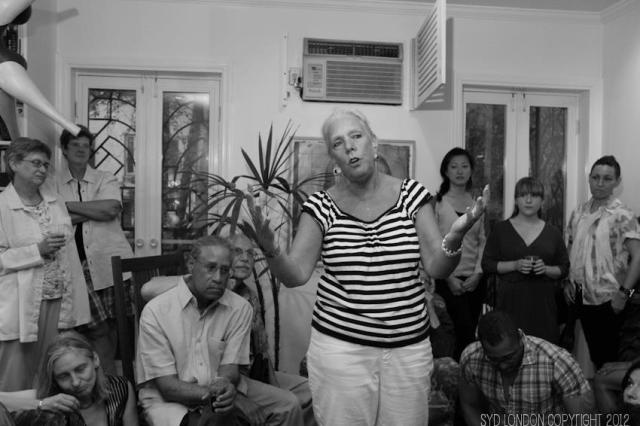
Hollibaugh elaborated on how the current moment in the mainstream queer movement allows organizations like QEJ to be pushed out of the funding stream.
“It used to be that foundations that were queer-friendly, even if they weren’t queer-driven… knew they were confronting a real problem around race …and they knew they weren’t funding POC and class-driven queer groups and that they needed to do more. And so they began to prioritize that, but… in a funny way the success of having a vision around race and class and queerness, [means] there are now many more mainstream LGBT organizations that are POC or that serve poor people.”
As the queer movement has become more intersectional, it has also allowed issues of intersectionality to tilt more towards the mainstream. Organizations that bolster institutions that uphold systems like the criminal justice system ultimately still allow those systems to continue to perpetuate violence against queer and trans* people, just in a more organized and inclusive way. The non-profit system creates space for more voices at the proverbial table of the movement for queer rights, which Hollibaugh pointed out, is not the goal for queer liberation that QEJ envisioned:
“We don’t want to just be invited to the table – the table is wrong. Forget the table, we’re changing the table and we’re changing who’s invited to the table. Forget this! We’re not trying to be one more included constituency that gets named in this fight… it doesn’t solve the deeper question of gender conformity and inequality because of capitalism.”
Though the current movement helps some queers overcome barriers that might have once held them back, we can’t lose sight of the majority of queer people who are still struggling to get by. We need queer organizing and analyses that look at the whole political and economic framework.
So QEJ Has Closed. Where Do We Go From Here?
QEJ is folding as an organization and closing its office in the Miss Major – Jay Toole Building for Social Justice, but its work has not vanished, and certainly neither has its legacy. Two major projects are branching out of work that started at QEJ: Queer Survival Economies, which will continue under Hollibaugh’s leadership at the Barnard Center for Research on Women, and Jay’s House, an initiative by Toole to create the first LGBTQ homeless shelter for adults in New York City.
Toole, who came to QEJ as a shelter resident, directed QEJ’s shelter program from the start. Her own experience while homeless and living in the shelter system drove her work with QEJ and shapes her approach to Jay’s House.
“The [shelter system] is bad for everybody, but when you’re queer, it’s even worse. …Queers don’t come into the shelter system because they hear the stories. And I never went in until I was dying, because I would hear stories of how we were treated. And you know, it’s all true! I was beat up in shelters, I was thrown down stairs in shelters. …Being out and queer in the shelter system was not the safest thing to do. I always knew that at some point along the way I would try to build an organization that could house people, house queers, and it would be queers helping queers.”
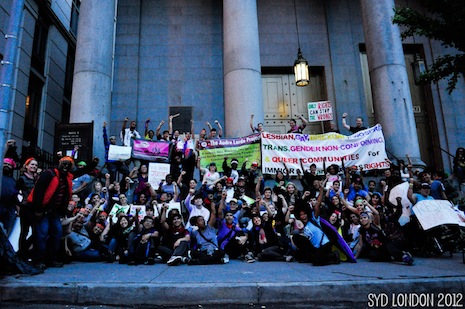
Other organizations, like the groups that share the Miss Major – Jay Toole Building — the Audre Lorde Project, the Sylvia Rivera Law Project, FIERCE and Streetwise and Safe — are constantly working to find sustainable modes of funding for radical organizing, and acknowledged this in a statement in December:
“We are committed to upholding QEJ’s vision and work through our respective organizations and communities until all our collective work is done. We send our deepest love and gratitude to QEJ for their righteous legacy and all that they have invested and built towards our collective liberation. Our work moving forward as MMJT is not to dwell on why this happened. Our role moving forward is to work towards transforming our movements, our resources, our funders and our strategies in order to interrupt this cycle of devaluation of our political work, our movements and our comrades.”
The queer community in New York is coming together to generate alternate income for Toole’s living expenses while she ends her work at QEJ and works to start up Jay’s House at the We Love Jay Campaign.
QEJ’s website will continue on for six more months, where their resources on economic justice, immigration, the prison industrial complex and welfare continue to be available.
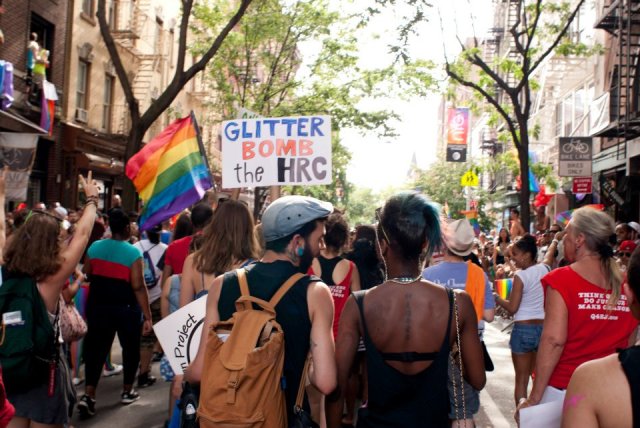
While QEJ will cease to exist as a 501(c)(3) with an office and paid staff, their impact lives on in the thousands of queer people affected by their analysis and activism, and in the organizations they worked alongside. As Blanco said to me,
“I just want people to know that QEJ is not an organization, but …will always be a philosophy. If you are a queer, you can be for economic justice. …You don’t have to have a 501(c)(3). If you’re queer and you’re dedicated to economic justice, then live that life and have those beliefs and carry them in your heart and put them into practice. I think as long as we stay dedicated to our community, nothing can stop us.”







